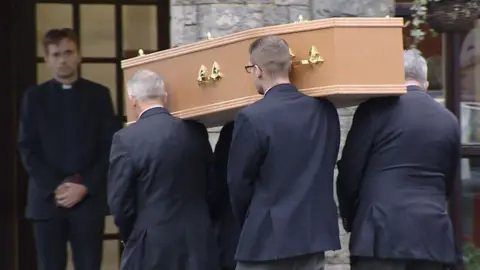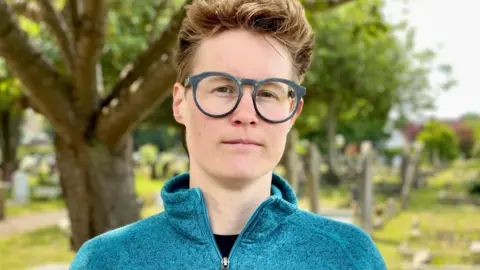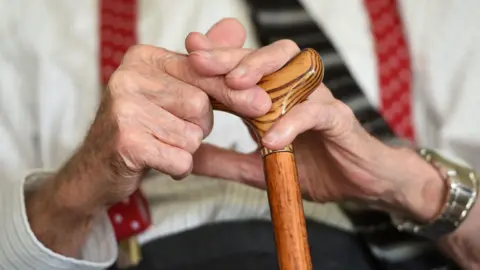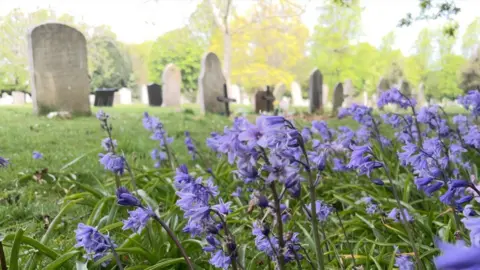Are taxpayers funding a cost of dying crisis?
 BBC
BBCTackling deprivation among older people in England is crucial to curbing an "unsustainable" increase in taxpayer-funded funerals, according to new research.
The study, by the ESRC Centre for Population Change (CPC), found London had the highest rate of state-funded cremations or burials. In Camden, almost one in 10 was paid for in this way.
Some coastal areas, such as Hastings and Blackpool, and the metropolitan areas of Birmingham, Manchester, Nottingham, Bristol and Leeds, also have comparatively high rates.
Prof Jane Falkingham, director of CPC based at the University of Southampton, said there was "a clear link between poverty and public health funerals" and the numbers have been rising.
Funerals paid for out of the public purse used to be known as "paupers" funerals, but are now called "welfare" or "public health funerals" (PHF).
They happen when people die in poverty, alone or without relatives who can afford to cremate or bury them.
Responsibility usually falls on local authorities, with a recent snapshot survey by the Local Government Association revealing councils arrange an average of 12 funerals a day at an annual cost of about £6m.
In collaboration with the BBC, CPC academics at the University of Southampton discovered about a quarter of all public health funerals are carried out by NHS hospitals, at an additional estimated annual cost of £1.36m.
Researchers analysed data from hundreds of Freedom of Information requests carried out by BBC South and discovered the number of state-funded funerals rose from 4,760 in 2014-15 to 7,020 in 2020-21.
The size and demographics of the population in different parts of the country was also taken into account.
While establishing an estimated rate of PHF per 1,000 deaths over the seven-year period, Prof Jane Falkingham said London emerged as a "real hotspot".
"The biggest surprise for me was the rate in the Borough of Camden where nearly one in 10 of all funerals were actually 'public health' funerals.
"In some of our coastal communities too where we know we have high levels of deprivation, such as Blackpool and Hastings, it's around one in every 20 funerals."
The team also identified hotspots in areas with higher population density, greater homelessness and more overcrowding.
Overall, a lack of funds was found to be a bigger driver of need for state-funded funerals, rather than loneliness or a lack of family.
Camden Council said it was "proud" to offer a public health funerals service.
A spokesperson, who said rates had been "stable" since the pandemic, added: "We remain bold in our action to create a fairer borough and help ensure no one is left behind."
Councillor Anna Railton, from Oxford City Council, said organising funerals can be "really complicated" and "time-consuming" and every effort is made to reclaim costs from estates.
She said council staff have to work like detectives. "It involves going into the deceased person's home, trying to find a will and other important documents, and trying to track down next of kin, which can take months," she said.
"So you will be sat in a mortuary while this process takes place and the funeral you'll end up with is very basic."
This is because while hospitals and councils strive to uphold the dignity of the deceased, they must also keep costs down to safeguard taxpayers' money.

"By default, it'll be a cremation," said Anna, "unless there are religious reasons or the council finds a will that says otherwise and if it's a burial there'll be no marker, just a bare patch of grass.
"My advice to people is to put thought into your wishes and put money aside because I think most people wouldn't choose to go through this process."
Some NHS Trusts have stopped carrying out public health funerals for people who die in hospital, transferring the responsibility to local councils instead.
This has happened in east Dorset.
Bournemouth, Christchurch and Poole Council said taking over the local NHS trust's provision has cost about £21,000 extra a year.
In 2024, BCP Council's funeral bill totalled £46,000.
In Portsmouth, council papers revealed the "continued high demand in recent years" and the complex process of trying to claim money back from the estates of the deceased was "unsustainable".
Greatest need among men
 Joe Giddens/PA Wire
Joe Giddens/PA WireThe CPC's analysis backs up previous research which suggested the vast majority of people cremated or buried by the state are men.
The data shows the rate at which men die in poverty or without family who can afford funeral fees is about three times higher than the one for women.
Prof Falkingham believes one of the reasons for this was the difference in social networks between men and women, and cited other CPC research which suggests men are much more likely than women to enter into later life without a partner.
She said: "There has been an increase in the number of unpartnered men, particularly in mid-life, who either have never had a partner or who are not currently partnered having experienced marital breakdown.
"These men are much more likely to lose touch with their children and become isolated."

The CPC research also highlights a need for data to be collated and coordinated nationally so future demand could be projected, especially in the light of increasing levels of deprivation and kinlessness.
Responding to the research, the Local Government Association (LGA) called the rising number of public health funerals a "concern" and said it is essential "the most vulnerable in our society are treated with dignity".
Councillor Heather Kidd, chair of the LGA's Safer and Stronger Communities Board, said: "Councils need long-term certainty and sustainable funding to ensure that public health funerals, along with other essential services, can continue to be delivered to the high standard required."
If you have been affected by the issues raised in this story you can visit the BBC Action Line for support.
